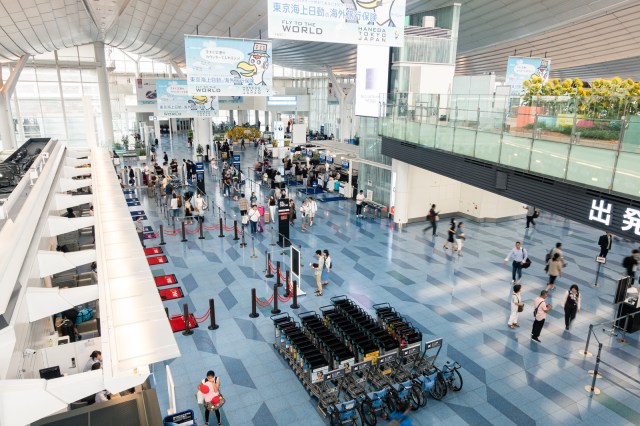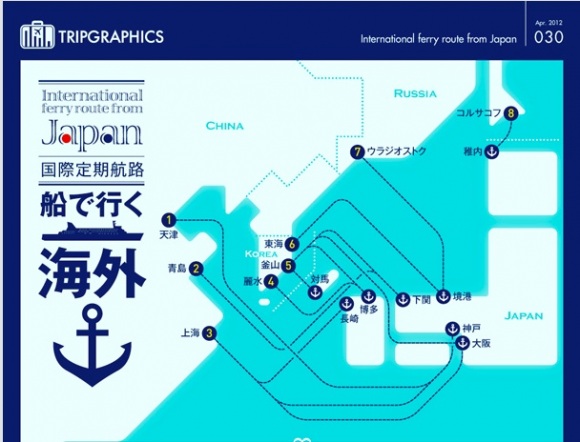Company also shares which departure dates are the most popular throughout the months of July and August so you can plan accordingly.
abroad
How many of you have ever heard of the Japanese word ‘wasei eigo’? A direct translation into English would be “Japanese-made English”, but put more simply the word refers to English words that, after a little tampering, have been adopted into the modern Japanese lexicon and used on an everyday basis. Despite having their origins in English, wasei eigo words often have quite different meanings to those on which they are based. Consequently, Japanese visitors to English-speaking countries using terms like “baby car” and “key holder” — words that are thought to be “English” in Japan — are often met with raised eyebrows and blank stares from native English speakers.
So come with us now as we look at the top 20 wasei English words that cause Japanese people trouble when they break them out while abroad.
If we asked you your travel plans for your next trip abroad, you would probably come up with a flight plan. It wouldn’t occur to most of us to take a boat. The fastest way to get from point A to point B particularly when B is overseas would have to be flying.
A ferry ride to foreign lands, compared to air travel ,may not be the most efficient way to go, but the sense of embarking on an adventure on the high seas, makes up for it! From an island country like Japan, surrounded on all sides by water, taking a ferry trip overseas is actually very reasonable.
Although it is not widely known, there are several ferry routes leaving at regular intervals from various ports across Japan. Where do these ferries go?
According to information from the Travel site Tripgraphics, ferries leave regularly for destinations in China, Korea, and Russia. There are frequent ferry departures to 8 ports of call in these three countries. Doesn’t it tickle the imagination? At the very least, you can’t help but be curious. What would a sea voyage be like? Read More



 Japanese restaurant chain serves Dragon Ball donuts and Senzu Beans this spring
Japanese restaurant chain serves Dragon Ball donuts and Senzu Beans this spring Japan Extreme Budget Travel! A trip from Tokyo to Izumo for just 30,000 yen [Part 1]
Japan Extreme Budget Travel! A trip from Tokyo to Izumo for just 30,000 yen [Part 1] Japan Extreme Budget Travel! A trip from Tokyo to Izumo for just 30,000 yen [Part 2]
Japan Extreme Budget Travel! A trip from Tokyo to Izumo for just 30,000 yen [Part 2] Japanese drugstore sells onigiri at pre-stupid era prices, but how do they compare to 7-Eleven?
Japanese drugstore sells onigiri at pre-stupid era prices, but how do they compare to 7-Eleven? Starbucks Japan releases first-ever Hinamatsuri Girls’ Day Frappuccino
Starbucks Japan releases first-ever Hinamatsuri Girls’ Day Frappuccino Ghibli’s Kiki’s Delivery Service returns to theaters with first-ever IMAX screenings and remaster
Ghibli’s Kiki’s Delivery Service returns to theaters with first-ever IMAX screenings and remaster Development of Puyo Puyo puzzle game for use in nursing homes underway
Development of Puyo Puyo puzzle game for use in nursing homes underway The entire Pokémon Red and Blue Kanto region map, built as a 3-D diorama, looks amazing【Photos】
The entire Pokémon Red and Blue Kanto region map, built as a 3-D diorama, looks amazing【Photos】 Nephew receives SD card after his uncle passes away, finds treasure trove of gems from the past
Nephew receives SD card after his uncle passes away, finds treasure trove of gems from the past Mt. Fuji climbing reservation website is now open, and here’s how to reserve your spot
Mt. Fuji climbing reservation website is now open, and here’s how to reserve your spot The 10 most annoying things foreign tourists do on Japanese trains, according to locals
The 10 most annoying things foreign tourists do on Japanese trains, according to locals Highest Starbucks in Japan set to open this spring in the Tokyo sky
Highest Starbucks in Japan set to open this spring in the Tokyo sky Tokyo Skytree turns pink for the cherry blossom season
Tokyo Skytree turns pink for the cherry blossom season Starbucks Japan releases new sakura goods and drinkware for cherry blossom season 2026
Starbucks Japan releases new sakura goods and drinkware for cherry blossom season 2026 Japan’s new “Cunte” contact lenses aren’t pronounced like you’re probably thinking they are
Japan’s new “Cunte” contact lenses aren’t pronounced like you’re probably thinking they are Shibuya Station’s Hachiko Gate and Yamanote Line stairway locations change next month
Shibuya Station’s Hachiko Gate and Yamanote Line stairway locations change next month Yakuzen ramen restaurant in Tokyo is very different to a yakuza ramen restaurant
Yakuzen ramen restaurant in Tokyo is very different to a yakuza ramen restaurant Starbucks Japan adds new sakura Frappuccino and cherry blossom drinks to the menu
Starbucks Japan adds new sakura Frappuccino and cherry blossom drinks to the menu Japan just had its first same-month foreign tourist decrease in four years
Japan just had its first same-month foreign tourist decrease in four years Burning through cash just to throw things away tops list of headaches when moving house in Japan
Burning through cash just to throw things away tops list of headaches when moving house in Japan Japan’s newest Shinkansen has no seats…or passengers [Video]
Japan’s newest Shinkansen has no seats…or passengers [Video] Foreigners accounting for over 80 percent of off-course skiers needing rescue in Japan’s Hokkaido
Foreigners accounting for over 80 percent of off-course skiers needing rescue in Japan’s Hokkaido Super-salty pizza sends six kids to the hospital in Japan, linguistics blamed
Super-salty pizza sends six kids to the hospital in Japan, linguistics blamed Starbucks Japan unveils new sakura Frappuccino for cherry blossom season 2026
Starbucks Japan unveils new sakura Frappuccino for cherry blossom season 2026 Foreign tourists in Japan will get free Shinkansen tickets to promote regional tourism
Foreign tourists in Japan will get free Shinkansen tickets to promote regional tourism Take a trip to Japan’s Dododo Land, the most irritating place on Earth
Take a trip to Japan’s Dododo Land, the most irritating place on Earth Naruto and Converse team up for new line of shinobi sneakers[Photos]
Naruto and Converse team up for new line of shinobi sneakers[Photos] Is China’s don’t-go-to-Japan warning affecting the lines at a popular Tokyo gyukatsu restaurant?
Is China’s don’t-go-to-Japan warning affecting the lines at a popular Tokyo gyukatsu restaurant? Survey asks foreign tourists what bothered them in Japan, more than half gave same answer
Survey asks foreign tourists what bothered them in Japan, more than half gave same answer Japan’s human washing machines will go on sale to general public, demos to be held in Tokyo
Japan’s human washing machines will go on sale to general public, demos to be held in Tokyo Starbucks Japan releases new drinkware and goods for Valentine’s Day
Starbucks Japan releases new drinkware and goods for Valentine’s Day We deeply regret going into this tunnel on our walk in the mountains of Japan
We deeply regret going into this tunnel on our walk in the mountains of Japan Studio Ghibli releases Kodama forest spirits from Princess Mononoke to light up your home
Studio Ghibli releases Kodama forest spirits from Princess Mononoke to light up your home Major Japanese hotel chain says reservations via overseas booking sites may not be valid
Major Japanese hotel chain says reservations via overseas booking sites may not be valid Put sesame oil in your coffee? Japanese maker says it’s the best way to start your day【Taste test】
Put sesame oil in your coffee? Japanese maker says it’s the best way to start your day【Taste test】 No more using real katana for tourism activities, Japan’s National Police Agency says
No more using real katana for tourism activities, Japan’s National Police Agency says Ghibli’s Kiki’s Delivery Service returns to theaters with first-ever IMAX screenings and remaster
Ghibli’s Kiki’s Delivery Service returns to theaters with first-ever IMAX screenings and remaster Development of Puyo Puyo puzzle game for use in nursing homes underway
Development of Puyo Puyo puzzle game for use in nursing homes underway The entire Pokémon Red and Blue Kanto region map, built as a 3-D diorama, looks amazing【Photos】
The entire Pokémon Red and Blue Kanto region map, built as a 3-D diorama, looks amazing【Photos】 Nephew receives SD card after his uncle passes away, finds treasure trove of gems from the past
Nephew receives SD card after his uncle passes away, finds treasure trove of gems from the past Mt. Fuji climbing reservation website is now open, and here’s how to reserve your spot
Mt. Fuji climbing reservation website is now open, and here’s how to reserve your spot Japanese jeweler launches new engagement and wedding rings with Sanrio character Tuxedo Sam
Japanese jeweler launches new engagement and wedding rings with Sanrio character Tuxedo Sam “25 Potential Culture Shocks from around the World” infographic offers tidbits of travel wisdom
“25 Potential Culture Shocks from around the World” infographic offers tidbits of travel wisdom 7-Eleven Japan’s sakura sweets season is underway right now!
7-Eleven Japan’s sakura sweets season is underway right now! We ate “the alien of Japan’s Ariake Sea,” and you can too, if you’re brave enough【Taste test】
We ate “the alien of Japan’s Ariake Sea,” and you can too, if you’re brave enough【Taste test】 We visit a Japanese convenience store in Hawaii, recommend the Spam
We visit a Japanese convenience store in Hawaii, recommend the Spam Spot the difference? Japanese women’s hairstyles in the 1910s were amazingly… similar
Spot the difference? Japanese women’s hairstyles in the 1910s were amazingly… similar Legendary pie cafe Anna Miller’s finally returns to Tokyo after three-year absence
Legendary pie cafe Anna Miller’s finally returns to Tokyo after three-year absence